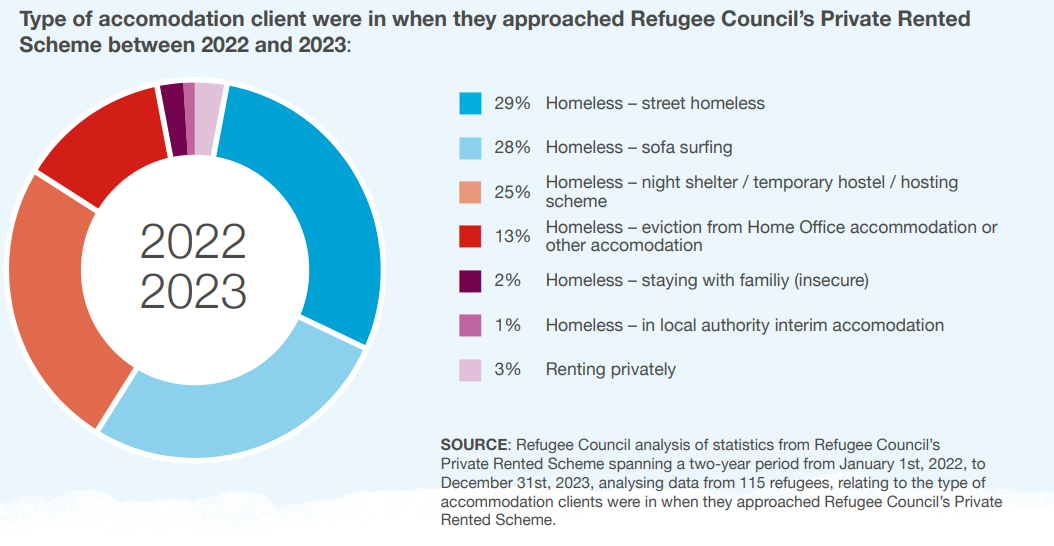The number of homeless refugees seeking emergency housing in UK councils has increased by 239% in the past two years, analysis shows, prompting charities to slam a “dysfunctional system” that leaves people on the streets and living in tents.
A new report from the charity Refugee Council shows a surge in the number of new refugees sleeping rough. In 2022, one in five refugees seeking help from services was sleeping rough. But by 2023, that number had risen to two in five.
The Home Office places asylum seekers in hotels while their applications are processed, but once they are granted asylum they will have 28 days to find new accommodation before being deported. Due to delays in issuing documents, some people may have as little as seven days to find a new home.
The number of asylum seekers in this position has surged in recent years as the Home Office works to clear a backlog of asylum applications, leading to a surge in the number of newly approved refugees. Council housing services have struggled to cope with the influx of people, leaving many people sleeping rough.
A total of 50,845 people were granted asylum between July and December last year, the highest number of asylum seekers on record and a 400% increase compared to the same period in 2022.
Government statistics analyzed by the Refugee Council charity show the number of homeless people requiring local authority support after being kicked out of Home Office hotels increased by 239% in the two years to September 2023.

In winter 2021, around 970 families in England faced homelessness due to evictions from Home Office hotels, but by autumn 2023 this number had risen to 3,290 families.
The problem is particularly acute in London, which has a larger refugee population than other areas. London Council reported a 234% increase in the number of rough sleepers who had recently left Home Office hotels between September 2023 and January 2024. More than 90% of these people receive a positive asylum decision, which means they have the right to live, study and work in the UK.
The findings came as the Home Office announced it would close 150 shelter hotels in early May as part of a pledge to reduce the government’s use of temporary accommodation.
Home Secretary James Cleverley promised to “keep working until the last hotel closes”.
Sudanese refugee Yahya, 25, waited almost three years for a positive asylum decision and then was told to leave an Interior Ministry hotel with just a week’s notice. He was forced to sleep rough for around ten days before seeking help from a charity.
He said: “When I received the decision that I could stay in the UK, I decided to study, take a motor vehicle course and become a mechanic. But when I received a deportation letter from the Home Office, my life was difficult, I was living on the streets…I had to leave the shelter within a week.”
He explained that if he didn’t go to college, he would be punished, so he slept on the street at night and went to college in the morning. “I have had very restless sleep for the past 10 days. When I was sleeping on the street, some people can snatch your bag when you have some important documents inside, your ID card and your decision documents.
“I couldn’t sleep all night and I had my bag tied to me. I know there are a lot of refugees sleeping on the streets but they still don’t get any help. A friend of mine has been there for over a month and they are from Eritrea and Sudan.”

Tom Cottam, director of policy at the British Red Cross, said: “We support people every day who face life on the streets after being granted refugee status because they have not had enough time to find work and housing. This includes People with physical and mental health needs.”
The British Red Cross is calling on the government to extend the notice period before hotel evictions to 56 days.
Four in ten people receiving cash assistance from the British Red Cross between August 2023 and March 2024 faced poverty as a result of the relocation process.
Refugee charity Care4Calais said: “Livable homes embedded in communities provide the best foundation for refugees who just want to integrate into society and get on with their lives.”
Enver Solomon, chief executive of the Refugee Council, said new arrivals were “doomed from the start”.
He added: “It’s completely unrealistic to get on your feet and find a private rental with no income and no savings in just 28 days. This dysfunctional system is creating completely avoidable homelessness and poverty crisis.”
The charity is calling on London’s next mayor to set up a fund to pay tenancy deposits for new refugees in the capital, and for the government to extend the eviction deadline to at least 56 days.
A government spokesman said: “Once newly recognized refugees have received their biometric residence permit, they have 28 days to leave asylum.
“Immigration Help Center and its partners also offer support, including advice on how to access Universal Credit, the labor market and where to get housing assistance.
“We are working to ensure individuals find the right person they need after an asylum decision is made, and to help local authorities better plan to reduce the number of asylum seekers waiting for a decision.”
Follow us on Google news ,Twitter , and Join Whatsapp Group of thelocalreport.in